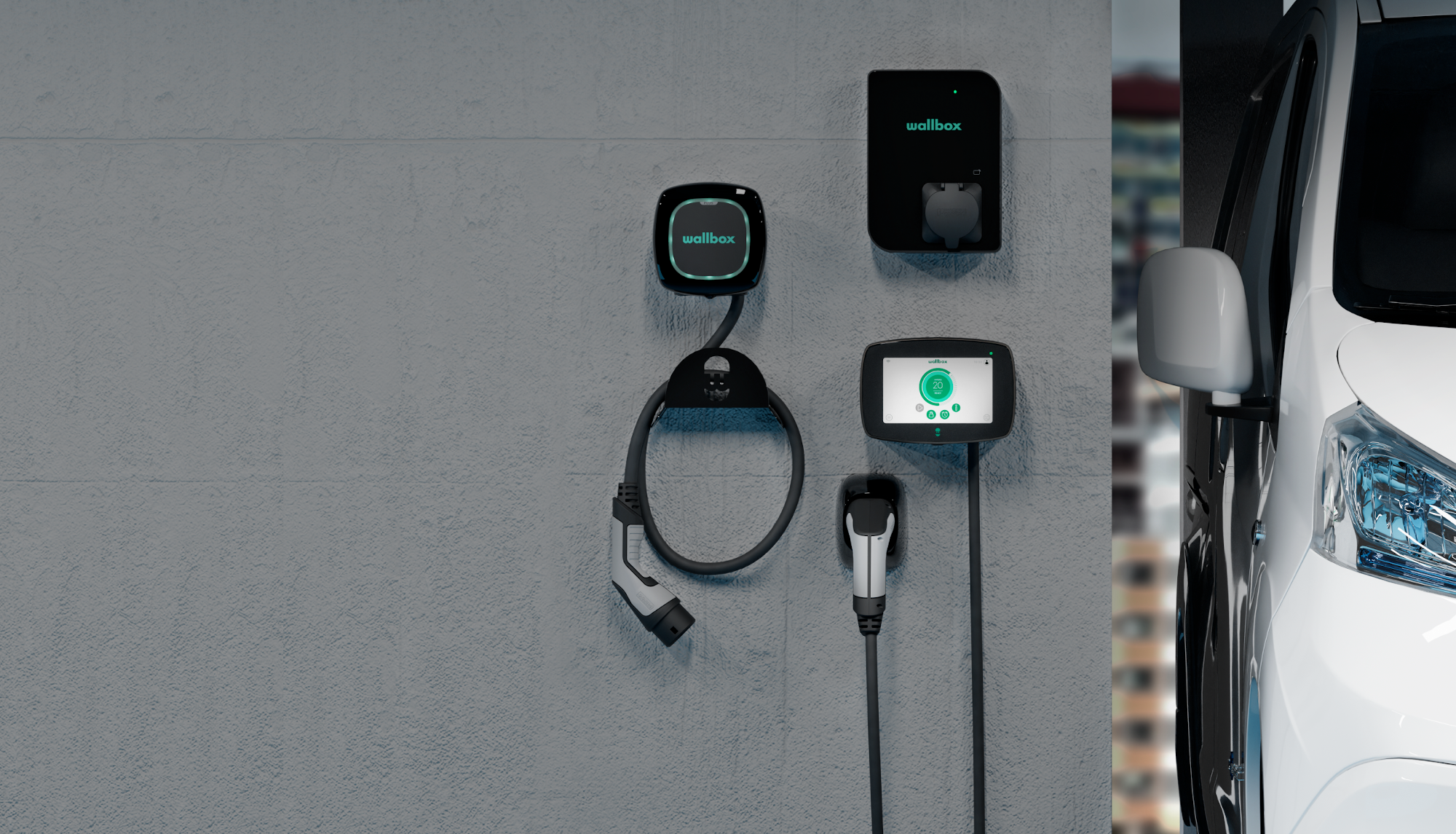Look for a charger that’s compatible with your car and your home. Let’s use the Pulsar Plus, a smart charger from Wallbox, as an example. You can choose between a Type 1 or Type 2 cable to ensure it works with your EV. It’s designed to be compact, so it can fit anywhere from crowded garages to tight parking spaces. You can choose between 7.4kW and 22kW options and adjust the power manually or automatically. More flexibility means more compatibility!
What makes a charger smart?
“Dumb” chargers charge...and that’s it. Some, like the charger that comes with your EV, plug directly into a standard outlet and can take up to a full day to charge! Most importantly, “dumb” chargers have no way of regulating the flow of energy so they can end up putting stress on your home’s electrical system, leading to overheated wiring and even blackouts.
Enter the smart charger! Not only will it safely charge your EV up to 8x faster than a standard outlet charger, it can communicate with your car, your home, your electric grid, and you. You can set charging schedules to charge when energy rates are at their lowest or track energy consumption, all through an app. A smart charger can also balance the amount of energy used between your car and home to avoid exceeding your local grid’s capacity and prevent blackouts. When your charger is connected, charging is faster, cheaper, safer and more sustainable!
What should I look for in a home charger?
Compatibility
Convenience
Reliability
Compatibility
Look for a charger that’s compatible with your car and your home. Let’s use the Pulsar Plus, a smart charger from Wallbox, as an example. You can choose between a Type 1 or Type 2 cable to ensure it works with your EV. It’s designed to be compact, so it can fit anywhere from crowded garages to tight parking spaces. You can choose between 7.4kW and 22kW options and adjust the power manually or automatically. More flexibility means more compatibility!
Convenience
A connected charger is a convenient charger. Check that your charger can be controlled by an app via Bluetooth and WiFi. The best apps will give you the power to schedule, start, stop, and check your charging status from your phone, smartwatch, or tablet! It doesn’t get much more convenient than charging from bed, right?
Reliability
Rain or shine, your charger has to work! Look for chargers that are water and dust resistant (hint: look for certifications like IP54 and IK08) and designed for indoor or outdoor installation. For added peace of mind, keep an eye out for long warranties that last at least three years.
Will any charger fit my car?
Not quite. But getting the right charger is easier than you think! Consider two main aspects: connector type and charging power.
1. Connector Type
This refers to the charging gun that will plug into your car. For home charging, there are two main options. You just need to identify the one that fits with your car.
 Type 1
Type 1
If you see 5 holes in your car’s charging port, then you’ll need a Type 1. This is the standard for North America and Asia. Some Type 1 models include the Citroën C-Zero, Mitsubishi Outlander, and early models of Kia Soul EV (before 2017) and Nissan LEAF (before 2015).
 Type 2
Type 2
If you see 7 holes in your car’s charging port, then you’ll need a Type 2. This is the standard for Europe. Some compatible models include all Tesla models, Audi e-tron, and Nissan LEAF (from 2018).
2. Charging Power
Smart home chargers come with different charging powers, typically ranging from 7.4kW to 22kW. In general, higher power means faster charging. But there are a couple things to keep in mind.
First, consider your home’s electrical wiring. If you have a 1-phase system, the maximum charging power available to you is 7.4kW whereas a 3-phase system can support up to 22kW. Check your fuse box or call your energy company if you’re unsure. Keep in mind, most homes in the UK are 1-phase.
Second, you need to check your car’s maximum charging speed. For example, the Nissan LEAF can only accept 6.6kW. So even if you use a 22kW charger, your car won’t charge any faster than 6.6kW. Meanwhile, a Tesla Model 3 has an 11kW onboard charger so you’ll want to invest in a higher power to take advantage of faster charging. (Quick tip: No Type 1 models exceed 7.4kW charging speed.)
How much does a smart home charger cost?
Chargers can range from £300 to £3000! A high-quality charger will last five years or more and, if you choose a charger with scheduling features, you’ll save hundreds in energy bills over it’s lifespan. Plus, now is the perfect time to invest in a charger because the UK offers some of the most generous grants in Europe. Need a reference point? Pulsar Plus is one of the most innovative chargers on the market and starts at just £589.
Can I install my charger myself?
Even if DIY is your greatest passion, by law you’ll need a certified electrician to install your charger. The good news is that when you work with an OZEV-approved installer, you’ll be eligible for up to £350 in savings from the UK government. Plus some charging providers like Wallbox offer easy installation service online so all you have to do is click, sit back, and relax!

A world of solutions.
Wallbox
Discover our complete range of chargers designed to fit your every need.
Find the best charging solutions for public, shared or private parking. Indoors or outdoors, Wallbox has got you covered.



